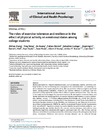| dc.contributor.author | Zhang, Zhihao | |
| dc.contributor.author | Wang, Ting | |
| dc.contributor.author | Kuang, Jin | |
| dc.contributor.author | Herold, Fabian | |
| dc.contributor.author | Ludyga, Sebastian | |
| dc.contributor.author | Li, Jingming | |
| dc.contributor.author | Hall, Daniel, L | |
| dc.contributor.author | Taylor, Alyx | |
| dc.contributor.author | Healy, Sean | |
| dc.contributor.author | Yeung, Albert, S | |
| dc.contributor.author | Kramer, Arthur, F | |
| dc.contributor.author | Zou, Liye | |
| dc.date.accessioned | 2022-07-13T12:49:54Z | |
| dc.date.available | 2022-07-13T12:49:54Z | |
| dc.date.issued | 2022-09 | |
| dc.identifier.citation | Zhang, Z., Wang, T., Kuang, J., Herold, F., Ludyga, S., Li, J., Hall, D. L., Taylor, A., Healy, S., Yeung, A. S., Kramer, A. F., & Zou, L. (2022). The roles of exercise tolerance and resilience in the effect of physical activity on emotional states among college students. International journal of clinical and health psychology : IJCHP, 22(3), 100312. https://doi.org/10.1016/j.ijchp.2022.100312 | en |
| dc.identifier.issn | 2174-0852 | |
| dc.identifier.uri | https://aecc.archive.knowledgearc.net/handle/123456789/163 | |
| dc.description | Available under License - Creative Commons Attribution: https://creativecommons.org/licenses/by-nc-nd/4.0/deed.en | |
| dc.description.abstract | Background/objective: Negative emotional states, such as depression, anxiety, and stress chal lenge health care due to their long-term consequences for mental disorders. Accumulating evi dence indicates that regular physical activity (PA) can positively influence negative emotional states. Among possible candidates, resilience and exercise tolerance in particular have the potential to partly explain the positive effects of PA on negative emotional states. Thus, the aim of this study was to investigate the association between PA and negative emotional states, and further determine the mediating effects of exercise tolerance and resilience in such a relation ship. Method: In total, 1117 Chinese college students (50.4% female, Mage=18.90, SD=1.25) com pleted a psychosocial battery, including the 21-item Depression Anxiety Stress Scale (DASS-21), the Connor-Davidson Resilience Scale (CD-RISC), the Preference for and Tolerance of the Inten sity of Exercise Questionnaire (PRETIE-Q), and the International Physical Activity Questionnaire short form (IPAQ-SF). Regression analysis was used to identify the serial multiple mediation, controlling for gender, age and BMI. Results: PA, exercise intensity-tolerance, and resilience were significantly negatively correlated with negative emotional states (Ps<.05). Further, exercise tolerance and resilience partially mediated the relationship between PA and negative emotional states. Conclusions: Resilience and exercise intensity-tolerance can be achieved through egularly engaging in PA, and these newly observed variables play critical roles in prevention of mental illnesses, especially college students who face various challenges. Recommended amount of PA should be incorporated into curriculum or sport clubs within a campus environment. | en |
| dc.language.iso | en | en |
| dc.publisher | International Journal of Clinical and Health Psychology | en |
| dc.subject | Exercise tolerance | en |
| dc.subject | Resilience | |
| dc.subject | Physical activity | |
| dc.subject | Emotion | |
| dc.subject | Depression | |
| dc.title | The roles of exercise tolerance and resilience in the effect of physical activity on emotional states among college students | en |
| dc.type | Article | en |
| dc.identifier.doi | https://doi.org/10.1016/j.ijchp.2022.100312 | |
